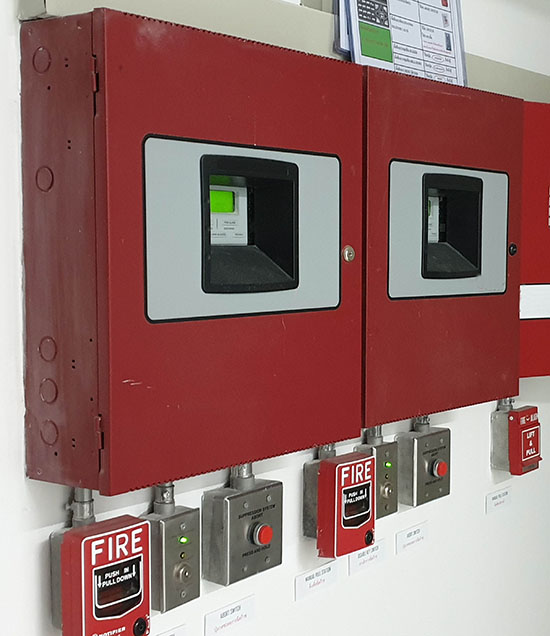
Fire Alarm Systems &
Fire Panel Services
Fire Alarm Systems, early detection of fire or smoke, alerting occupants, and facilitating emergency response.
Fire Alarm Components: Includes detectors, manual call points, notification devices, control units, and system interfaces.
Fire Alarm Types: Conventional, addressable, and wireless systems, suitable for various building types from residential to industrial.
Fire Panel Services, Function: Fire Alarm Control Panels (FACPs) act as the central hub, managing system responses to fire detection. Services:
Fire Alarm Installation, inspection, testing, maintenance, and monitoring.
Fire Alarm Customization, integration with other building systems, and training for staff. Importance: Ensures system reliability, compliance with safety codes, and potential life-saving functionality. Trends: Includes smart technology integration, cloud-based monitoring, and energy-efficient designs.
Common Challenges: Staying updated with technology advancements. Adhering to diverse regulatory requirements. Balancing cost with safety needs. Both systems and services are crucial for building safety, requiring regular attention to maintain effectiveness in emergencies.
- Fire Alarm Systems
- Fire Panel
- Fire Code Safety
- Lithium Batteries
- Tires
- Chemicals
Molnar & Associates Fire Protection Services
- (440)975-6835 Call Us Today
Fire Alarm Systems and their programming must comply with local fire codes, standards like NFPA (National Fire Protection Association), and building regulations.
Fire Alarm Systems
Each type of system, whether conventional or addressable, wired or wireless, must be selected based on the specific needs of the building, considering factors like size, occupancy, and local fire codes.
Fire Panel Services
This is the central hub that monitors inputs from various devices, controls outputs, and manages the entire system. It's usually located in an electrical or panel room for easy access by maintenance and emergency personnel.
Fire Alarm Regulations and Compliance
The National Fire Protection Association sets forth NFPA The National Fire Alarm and Signaling Code, which provides guidelines for the design, installation, maintenance, and testing of fire alarm systems. It's crucial for ensuring that systems are compliant.
Fire Detection Solutions
Fire detection systems monitor smoke and heat detectors, water flow devices, and pull stations, ensuring compliance with UL, CFSM, NFPA, and ADA standards. Monitoring Center verifies alarms and sends precise information to firefighters, thereby reducing potential damage to people, property, and products.
Fire Alarm Installations
Fire alarm Installations in commercial and industrial settings consist of a control panel, initiating devices (smoke/heat detectors, pull stations), notification devices (alarms, strobes), and dual power supplies (primary and backup) to ensure round-the-clock operation and safety.
Fire Protection Experts
With over 25 years in fire protection, we provide comprehensive services to prevent fires, reduce damage, and protect lives and property. Our offerings include installing fire alarms, sprinklers, and smoke detectors, developing evacuation plans, conducting fire safety training, and performing regular inspections to mitigate fire risks in buildings and facilities.
Experience Matters. You must first master the knowledge necessary to devise a comprehensive and innovative solution that is both safe and cost-effective.
Fire Panel Inspections
Fire panel inspections should conduct a visual inspection of the panel and its components, check for any trouble signals or error messages, test the system's functionality by activating different detection devices, verify power supply and battery backup, inspect wiring for damage, and document any issues found.